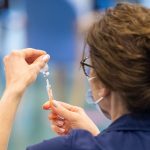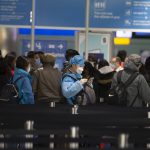A scientist has called for vaccinated people to be allowed to meet up with each other and to travel freely, saying there is no scientific reason why this should be forbidden.
Professor Tim Spector, who leads the COVID Symptom Tracker app study run by King’s College London, said the vaccination programme was successful and now people’s mental health needs to be considered.
He told the PA news agency: “I think we’re actually in a much better place than many people are telling us, and I, for one, I’m not worried too much about what’s happening abroad.
Live COVID updates from across the UK and around the world
“I think we need to start talking about when people who have been vaccinated can start seeing other vaccinated people.
“And there’s no real science now stopping, for example, me seeing my vaccinated mother in a care home or, you know, wherever they live.
“So I think we need to start moving to this next area and realise that our plan is working, and that we were doing well.”
He also described fears of new variants being brought in by British tourists from Europe and elsewhere as a “bit of a smokescreen”, adding: “I think we do need to realise why we have areas of the country that are hard to get rid of the virus.
“Anyone travelling from an area of low COVID to an area of high COVID is obviously putting themselves more at risk of getting infected, so that’s a consideration even within this country.
“But if you’ve been vaccinated, and many of the elderly people have, there’s no scientific rationale to stop them from travelling.”
Travelling out of the UK for a holiday is currently banned, with the threat of a £5,000 fine if a person is caught, but some countries have said they would welcome vaccinated Britons.
There have also been concerns that allowing the rules to be different for those already vaccinated would be unfair, as many people – particularly younger people – are not yet eligible to receive the coronavirus vaccine.
Younger people have also suffered more heavily in terms of job losses during the pandemic due to various lockdowns, despite the fact that they are at lower risk from the disease than older people.
Please use Chrome browser for a more accessible video player
Earlier this week, ONS figures showed that people aged between 16 and 24 make up 61% of those who have lost payrolled employment during the crisis.
But Prof Spector said that, while he could see the arguments for “not splitting the country into two”, the “mental state of many people and the needs of elderly people… ought to be equally considered”.
He said it would be best if both people meeting up had received both doses of the vaccine but added that, even with just one dose “you’re not going to get anything that’s going to put you into hospital”.
“You might get mild disease possibly in a really rare occurrence, but you know these are still going to be very rare.
“I think ideally, yes, wait for both vaccines for both people, but I think once you’ve gone over a month after your first one, most people are going to be safe to see people who are free of COVID and themselves vaccinated.”
Mark Woolhouse, professor of infectious disease epidemiology at the University of Edinburgh, said that border closures would only delay – not prevent – the arrival of new pathogens or variants.
He added: “If the government chooses to curtail travel, that will not prevent the problem. That will not prevent the next wave.
“The idea that somehow bringing in extra cases from overseas tips the balance and sends us into an epidemic we wouldn’t have had without that is just simply wrong.”
He said that delaying the arrival of new variants was good if that extra time was used – “so what are we going to do with the time that we bought by delaying it?”
Please use Chrome browser for a more accessible video player
Professor Chris Whitty, speaking on the anniversary of the UK’s first lockdown earlier this week, warned of “bumps and twists on the road” as the country attempts to recover from the pandemic.
And he also highlighted the “very big job of work” in preventing “lifelong” problems related to the effect of lockdowns, such as increased deprivation and non-COVID health issues.
England’s chief medical officer also predicted a further spike in infections at some point and warned of possible vaccine supply problems.
“There will definitely be another surge at some point whether it’s before winter or next winter, we don’t know,” he said.
“Variants are going to cause problems, there will be stockouts of vaccines and no doubt there will be multiple problems at a national level but also at a local level – school outbreaks, prison outbreaks, all those things that people are dealing with on a day-to-day basis.”






















